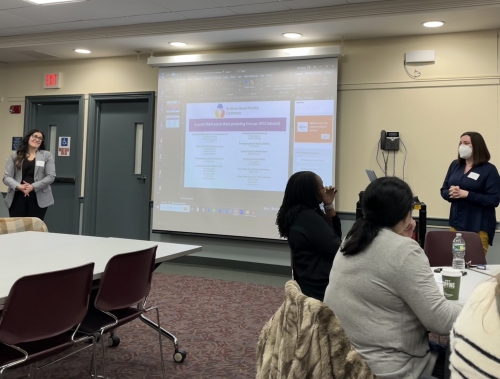
This is the fourth post in our special blog series taking a closer look at the impact of Connecticut’s behavioral health workforce challenges on children and families – and exploring solutions. Read the rest of the series here.
April 5, 2024
By Jack Lu, Ph.D., LCSW, Director of Implementation
Connecticut has made great strides in children’s behavioral health services and has been recognized as a national leader in quality care. However, as my colleagues reported in a strategic plan last year, this strong foundation is being put at risk by two concurrent challenges: an increase in youth behavioral health needs and a growing shortage in the behavioral health workforce. Now, new data analysis from our team reveals that Connecticut is not just losing clinicians overall – we’re losing the most experienced and effective clinicians at a rapid rate.
For nearly 20 years, CHDI has worked alongside state agencies and community-based outpatient behavioral health providers to train over 2,700 clinicians in evidence-based practices (EBPs). These clinicians went on to serve over 20,000 youth and families across Connecticut. We do this because EBPs (such as TF-CBT and MATCH*) help ensure that youth and families receive high-quality, trauma-informed care and demonstrate superior, more equitable outcomes over conventional talk therapies. On average, children receiving an EBP experience 55-75% greater symptom improvement compared to “treatment as usual.”
In working with clinicians around the state, I’ve heard many firsthand stories about their challenges with staffing, higher caseloads, and growing acuity among the children and youth they serve. However, when I reviewed recent data from our team’s Quality Improvement work with the state’s Outpatient Psychiatric Clinics for Children (OPCCs), even I was surprised. Despite an overall increase in the number of EBP clinicians actively practicing, Connecticut is losing its most experienced and EBP-trained clinicians at a faster rate than we’ve previously seen.
According to our EBP training records, between 2019 and 2022, the average turnover rate for clinicians trained in TF-CBT and MATCH was 25%. In 2023 alone, the turnover rate had increased to 33%. Even more troubling, clinicians who left in the past year had approximately 25% more years of experience when compared to those who left in previous years.
And overall, more experienced clinicians (EBP-trained or not) are leaving outpatient community-based providers. According to a 2023 survey of Connecticut OPCCs, since 2019, the average experience level of outpatient clinical staff has decreased from approximately 6 years to 5 years (as illustrated in the graph above). (Stay tuned for an upcoming post in this series from my colleagues Katie Newkirk and Kellie Randall, who will discuss the implications of this data for prioritizing the state’s workforce training needs).
"Connecticut is losing its most experienced EBP-trained clinicians at a faster rate than we've previously seen."
I asked my colleague, Allison Valenti, LMFT, who worked as an outpatient EBP clinician prior to joining CHDI, about the impact of this trend. “Clinicians who have been trained in evidence-based practices and have multiple years of experience are valuable, because with that experience comes an increase in comfort and clinical skill to manage complex situations,” she told me. “Successfully working with clients who have the complex diagnoses and/or trauma histories that typically lead to the use of EBPs also takes a level of confidence that only comes with time and experience.”
From my own work with these providers, I know firsthand that these are special people: their commitment to ensuring the best possible outcomes for the families they work with is demonstrated in their investment in significant ongoing training and quality improvement, despite the additional time, energy, and workload required. Experienced clinicians also get to know their clients and families better, ensure continuity of care over time, and often become trusted resources for families and the community.
EBP clinicians with more experience also often serve formal (e.g., supervisor, team leader) and informal (e.g., mentor) leadership roles due to their expertise. As Allison told me, “The agency really benefits from experienced EBP clinicians because they’re able to support training and supervising newer staff, and can help navigate the additional data systems that come with being on an EBP team.”
*TF-CBT stands for Trauma-Focused Cognitive Behavioral Therapy; MATCH stands for Modular Approach to Therapy for Children with Anxiety, Depression, Trauma, or Conduct Problems. Learn more about these EBPs here.
Since the COVID-19 pandemic, three key factors contextualize this emerging pattern:
Clinicians in community-based, outpatient settings often serve youth and families that may experience unmet social needs, have high client caseload expectations, and serve those with higher symptom acuity while they are on waitlists for more intensive services. As mentioned above, experienced EBP clinicians often serve formal and informal leadership roles and serve as champions of quality care. Although EBP clinicians may serve as champions of quality care, these additional roles can add stress and burnout.
Though some may pursue promotions through supervisory or administrative roles as these jobs become available, EBP clinicians who continue to serve Connecticut youth and families with high-quality care may not often experience clear pathways for their career advancement. Recognition for EBP clinicians and their high-quality service may often remain financially under-recognized or appreciated.
“In comparison to other fields which require the same amount of education, social work sits at the bottom for salary,” shared one clinical social worker in response to a survey conducted by CHDI last year. “With inflation, student loans, and other living costs, it is very difficult to support myself with what I earn, and that makes it hard for me to provide support to others.”
The appeal of private practices – which typically offer higher wages, schedule and session format flexibility, and less stringent administrative requirements than community-based agencies - is well-known. Since 2020, several legislative enhancements have further increased the appeal of private practice, including telehealth expansion, Medicaid associate-level license reimbursement, and the Health Care Provider Reimbursement Loan program.
While these changes benefited both community-based agencies and private practices, in some cases they have had the unintended impact of making private practice an even more attractive option for clinicians. To counteract this, we need a concerted effort to prioritize financial investments into community-based provider settings, especially for EBP clinicians who are well-trained and provide great care.
"With inflation, student loans, and other living costs, it is very difficult to support myself with what I earn, and that makes it hard for me to provide support to others." - CT provider, 2023 CHDI Survey
Ensuring that EBP clinicians are providing high-quality care requires an investment of time, effort, and funding. State-supported EBP clinicians receive 1) rigorous multi-day training, 2) ongoing consultation both in clinical practice and use of quality improvement data, and 3) access to ongoing best practices to help evolve their skills even further.

Image Description: CHDI staff leading a meeting for Connecticut OPCC providers in March.
State-supported EBPs offer significant value for youth and families in Connecticut. This upfront investment expands access to high-quality care and reduces outcome disparities for youth of color and across diverse ages, economic backgrounds, and gender identities. TF-CBT and MATCH, for example, are now widely accessible across dozens of nonprofit outpatient providers, where nearly 70% of the youth and families served are enrolled in Husky, Connecticut’s Medicaid program for families experiencing economic hardship and other unmet social needs.
However, if our most experienced and effective EBP clinicians continue leaving at the current pace, we risk losing some of the return on the state’s initial investment– and reducing access to these effective treatments for children and families. To prevent this, Connecticut must support the clinicians who provide such essential value.
CHDI’s recent strategic plan to strengthen Connecticut’s behavioral health workforce outlines essential strategies that will help the state to retain EBP clinicians in community-based settings:
In the short-term, emergency grant funds should be directed toward community-based behavioral health providers to enable them to offer retention stipends for EBP clinicians, particularly those who have actively practiced EBPs for more than two years. These funds would help to compensate EBP clinicians for their additional time and effort in providing high-quality care and provide incentives to stay. A portion of these emergency funds could also be used to decrease client caseloads for EBP clinicians, which will reduce burnout.
Other states have already begun distributing funds to help behavioral health providers recruit and retain staff. In 2023, the Massachusetts state legislature approved two one-time payments to providers calculated as 10% of agency expenditures to be used primarily for recruitment and retention activities. In 2022, Oregon allocated $132 million for “Workforce Stability Grants” for providers serving uninsured or publicly insured youth or adults, to be used for enhancing employee compensation, recruitment, and retention.
As our CEO, Jeff Vanderploeg, wrote in an earlier post in this series, a recent report on Medicaid reimbursement rates from the state Department of Social Services shed light on the fact that Connecticut’s behavioral health providers are among the most underpaid health care providers when compared both to other healthcare fields and peers in other states. Recognizing that EBP clinicians provide a valued service in community-based settings, Connecticut should pursue and prioritize a Medicaid State Plan Amendment that sets higher reimbursement rates for EBP session encounters.
Beyond these immediate solutions, sustainable retention of EBP clinicians in community-based settings should involve a value-based model of care reimbursement. This model should promote higher reimbursement rates for EBP clinicians who achieve improved outcomes given their expertise and capacity to reduce outcome disparities for youth of diverse social identities.
Connecticut has made important progress in expanding access to evidence-based behavioral health treatments. But if we don’t want to lose ground, retaining our most experienced and skilled EBP clinicians will be essential for children, youth, and families who have a right to receive high-quality and effective care.
This is the fourth post in our special blog series taking a closer look at the impact of Connecticut’s behavioral health workforce challenges on children and families – and exploring solutions. Read the rest of the series here.
Strengthening the Behavioral Health Workforce for Children, Youth, and Families: A Strategic Plan for Connecticut (CHDI, 2023)
Infographic: Evidence-Based Practices & Treatments for Children’s Behavioral Health in Connecticut
CHDI’s Work to Disseminate and Support Implementation of Evidence-Based Practices
We Need to Talk About Reimbursement Rates (CHDI Blog Series, 2024)
Modernizing Outpatient Behavioral Health Care for Children: A More Flexible and Efficient Approach to Improve Access (CHDI Issue Brief, 2022)
EBP/EBT Video Series (CHDI, 2023)

|
Jack Lu, Ph.D, LCSW - Director of Implementation jlu@chdi.org |